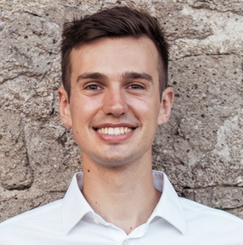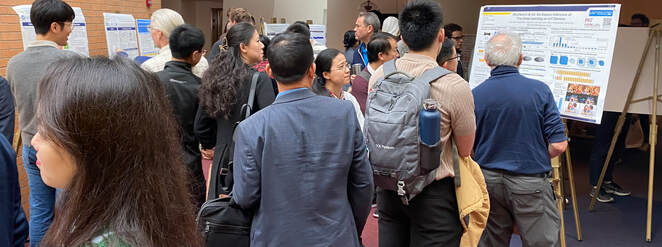The IAP CMU Workshop on the Future of AI and Security in the Cloud will be conducted on Friday, November 8, 2024 at CMU.
Time: 8:30AM–4PM (Badge Pick-up at 8:30AM – Please check back later for Registration Info and Agenda
Venue: Gates Hillman Room 6115, CMU, Pittsburgh, PA
Time: 8:30AM–4PM (Badge Pick-up at 8:30AM – Please check back later for Registration Info and Agenda
Venue: Gates Hillman Room 6115, CMU, Pittsburgh, PA
Expect a full day of talks by leading experts on the CMU faculty and industry on the status and future of AI and Security in the cloud and edge - ranging from infrastructure to applications - AI and machine learning, hardware acceleration, networking, security and storage.
The audience is a mix of CMU faculty, graduate students in CS and ECE, and industry. Between the morning and afternoon sessions, we will host a research poster session for PhD students with a Best Poster Award of $300.
This workshop is co-organized by the IAP and Prof. Riccardo Paccagnella, in collaboration with CyLab.
Testimonials from Previous Workshops
Professor David Patterson, the Pardee Professor of Computer Science, UC Berkeley, “I saw strong participation at the Cloud Workshop, with some high energy and enthusiasm; and I was delighted to see industry engineers bring and describe actual hardware, representing some of the newest innovations in the data center.”
Professor Christos Kozyrakis, Professor of Electrical Engineering & Computer Science, Stanford University, “As a starting point, I think of these IAP workshops as ‘Hot Chips meets ISCA’, i.e., an intersection of industry’s newest solutions in hardware (Hot Chips) with academic research in computer architecture (ISCA); but more so, these workshops additionally cover new subsystems and applications, and in a smaller venue where it is easy to discuss ideas and cross-cutting approaches with colleagues.”
Professor Hakim Weatherspoon, Professor of Computer Science, Cornell University, “I have participated in three IAP Workshops since the first one at Cornell in 2013 and it is great to see that the IAP premise was a success now as it was then, bringing together industry and academia in a focused workshop and an all-day exchange of ideas. It was a fantastic experience and I look forward to the next IAP Workshop.”
Professor Ken Birman, the N. Rama Rao Professor of Computer Science, Cornell University, “I actually thought it was a fantastic workshop, an unquestionable success, starting from the dinner the night before, through the workshop itself, to the post-event reception for the student Best Poster Awards.”
Dr. Carole-Jean Wu, Research Scientist, AI Infrastructure, Facebook Research, and Professor of CSE, Arizona State University, “The IAP Cloud Computing workshop provides a great channel for valuable interactions between faculty/students and the industry participants. I truly enjoyed the venue learning about research problems and solutions that are of great interest to Facebook, as well as the new enabling technologies from the industry representatives. The smaller venue and the poster session fostered an interactive environment for in-depth discussions on the proposed research and approaches and sparked new collaborative opportunities. Thank you for organizing this wonderful event! It was very well run.”
Nathan Pemberton, PhD student, UC Berkeley (currently Applied Scientist at AWS), "IAP workshops provide a valuable chance to explore emerging research topics with a focused group of participants, and without all the time/effort of a full-scale conference. Instead of rushing from talk to talk, you can slow down and dive deep into a few topics with experts in the field."
Dr. Pankaj Mehra, VP Product Planning, Samsung (currently CEO Elephance Memory), "Terrifically organized Workshops that give all parties -- students, faculty, industry -- valuable insights to take back"
Professor Vishal Shrivastav, Purdue University, “Attending the IAP workshops as a PhD student at Cornell was a great experience and very rewarding. I really enjoyed the many amazing talks from both the industry and academia. My personal conversations with several industry leaders at the workshop will definitely guide some of my future research."
Professor Ana Klimovic, ETH Zurich, “I attended three IAP workshops as a PhD student at Stanford, and I am consistently impressed by the quality of the talks and the breadth of the topics covered. These workshops bring top-tier industry and academia together to discuss cutting-edge research challenges. It is a great opportunity to exchange ideas and get inspiration for new research opportunities."
Dr. Richard New, VP Research, Western Digital, “IAP workshops provide a great opportunity to meet with professors and students working at the cutting edge of their fields. It was a pleasure to attend the event – lots of very interesting presentations and posters.”
The audience is a mix of CMU faculty, graduate students in CS and ECE, and industry. Between the morning and afternoon sessions, we will host a research poster session for PhD students with a Best Poster Award of $300.
This workshop is co-organized by the IAP and Prof. Riccardo Paccagnella, in collaboration with CyLab.
Testimonials from Previous Workshops
Professor David Patterson, the Pardee Professor of Computer Science, UC Berkeley, “I saw strong participation at the Cloud Workshop, with some high energy and enthusiasm; and I was delighted to see industry engineers bring and describe actual hardware, representing some of the newest innovations in the data center.”
Professor Christos Kozyrakis, Professor of Electrical Engineering & Computer Science, Stanford University, “As a starting point, I think of these IAP workshops as ‘Hot Chips meets ISCA’, i.e., an intersection of industry’s newest solutions in hardware (Hot Chips) with academic research in computer architecture (ISCA); but more so, these workshops additionally cover new subsystems and applications, and in a smaller venue where it is easy to discuss ideas and cross-cutting approaches with colleagues.”
Professor Hakim Weatherspoon, Professor of Computer Science, Cornell University, “I have participated in three IAP Workshops since the first one at Cornell in 2013 and it is great to see that the IAP premise was a success now as it was then, bringing together industry and academia in a focused workshop and an all-day exchange of ideas. It was a fantastic experience and I look forward to the next IAP Workshop.”
Professor Ken Birman, the N. Rama Rao Professor of Computer Science, Cornell University, “I actually thought it was a fantastic workshop, an unquestionable success, starting from the dinner the night before, through the workshop itself, to the post-event reception for the student Best Poster Awards.”
Dr. Carole-Jean Wu, Research Scientist, AI Infrastructure, Facebook Research, and Professor of CSE, Arizona State University, “The IAP Cloud Computing workshop provides a great channel for valuable interactions between faculty/students and the industry participants. I truly enjoyed the venue learning about research problems and solutions that are of great interest to Facebook, as well as the new enabling technologies from the industry representatives. The smaller venue and the poster session fostered an interactive environment for in-depth discussions on the proposed research and approaches and sparked new collaborative opportunities. Thank you for organizing this wonderful event! It was very well run.”
Nathan Pemberton, PhD student, UC Berkeley (currently Applied Scientist at AWS), "IAP workshops provide a valuable chance to explore emerging research topics with a focused group of participants, and without all the time/effort of a full-scale conference. Instead of rushing from talk to talk, you can slow down and dive deep into a few topics with experts in the field."
Dr. Pankaj Mehra, VP Product Planning, Samsung (currently CEO Elephance Memory), "Terrifically organized Workshops that give all parties -- students, faculty, industry -- valuable insights to take back"
Professor Vishal Shrivastav, Purdue University, “Attending the IAP workshops as a PhD student at Cornell was a great experience and very rewarding. I really enjoyed the many amazing talks from both the industry and academia. My personal conversations with several industry leaders at the workshop will definitely guide some of my future research."
Professor Ana Klimovic, ETH Zurich, “I attended three IAP workshops as a PhD student at Stanford, and I am consistently impressed by the quality of the talks and the breadth of the topics covered. These workshops bring top-tier industry and academia together to discuss cutting-edge research challenges. It is a great opportunity to exchange ideas and get inspiration for new research opportunities."
Dr. Richard New, VP Research, Western Digital, “IAP workshops provide a great opportunity to meet with professors and students working at the cutting edge of their fields. It was a pleasure to attend the event – lots of very interesting presentations and posters.”


